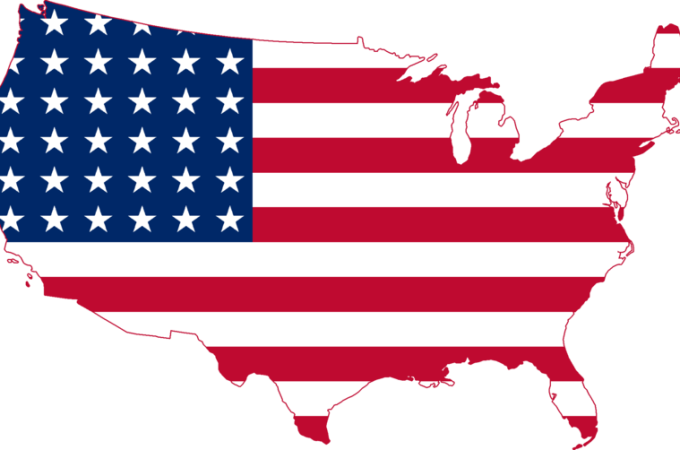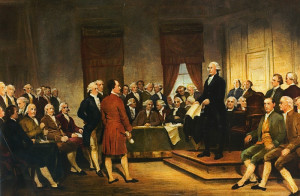What is the meaning of America? What does it mean to be an American? I’ve been giving a lot of thought to this recently. Unlike most nations, America* is not defined by a shared ethnicity. We come from all over the world. Some are recent arrivals, others have lived here for hundreds of years, and some even longer.
As many have observed, what defines America isn’t shared ethnicity, but rather, a set of ideas and values. As Margaret Thatcher put it, “Europe was created by history. America was created by philosophy.”
One of the great tragedies of our present moment is that so many Americans are ignorant of their history. There isn’t a commonly held understanding of what makes America “America.” We’ve lost a basic sense of who we are and as a result, we’ve become deeply divided. I’ve observed this division not only within America as a whole, but also within the evangelical church.
This division doesn’t bode well for our future. It concerns me greatly. This is, after all, my home. It’s my children’s home, and it may be the home of my children’s children. God providentially placed me here. I am called to work for its good.
My wife and I home school, and at the moment, I’m teaching American history to my two teenage sons. This has given me the opportunity to reflect again on the meaning of America. What are the ideas and values that have made us what we are? How were they articulated by our founders? How have they been lived out and given cultural form?
I’ve attempted to distill this set of ideas and values down to what might be called “the American core.” Taken as a whole, I would argue that these are what have made America “America.”
- The acknowledgement of a transcendent moral order.
- God-given rights to life, liberty, and freedom of conscience.
- The inherent dignity and value of all people.
- The rule of law (constitutionalism) as opposed to the rule of a king, oligarchy or majority.
- The importance of a flourishing civil society (strong families and religious, educational and charitable institutions) in forming virtuous, self governing citizens, and helping those in need.
- The importance of diffusing power (federalism, republicanism) rooted in a recognition of the human tendency to amass power toward selfish and corrupt ends.
- The importance of hard work and personal responsibility.
- Private property rights and the ability of people to realize the fruits of their labor and creativity.
- The ability to freely exchange goods and services.
- Generosity—a willingness to give sacrificially to help those in need and improve our communities.
Now obviously, there is no one accepted list of core American ideas and values. Thoughtful people would add to, subtract from, or modify this list. But I think a fair-minded reading of our founding documents and the assumptions that undergird them can be reasonably summarized as I have done.
America represents particular ideas and ideals
These ideals and values have been embodied individually, collectively, and institutionally. They have been given form in a distinct culture—a “way of doing things”— described by de Tocqueville when he visited America in the 1830s. The same culture he observed then is still recognizable today. Having traveled extensively abroad, including a two-year stint in Japan, I’ve had the privilege of “seeing” this American culture from the outside, gaining a perspective that is almost impossible to have from “inside the fish bowl.” In the process, I’ve come to see just how much my life has been shaped and formed by these American ideas and values. I am an American and proud to be so.
America isn’t America because we perfectly live up to these ideals. We don’t and we never have. We are not the New Jerusalem. We are a fallen people who are as prone to greed and self-centeredness as anyone, anywhere, at any time. Our history is marked by example after example of how we’ve fallen far short of these ideals. Many of our Founding Fathers failed to live up to them—a fact that doesn’t repudiate the ideals but merely recognizes that the founders were flawed human beings. There is much in America’s history to repent over. Yet I believe America is at its best when we’ve striven to be faithful to these core ideals.
Some will object to this list by pointing out that many Americans don’t subscribe to one or more items, and yet they too are Americans. This is true. In our present moment, the cultural bonds that unite us have grown dangerously weak. Sadly, there is no denying that we find ourselves in what some have called a culture war. This grieves me deeply—and while I wish it were not so, wishing doesn’t change reality. This American core is under sustained attack, and it may not survive. A new culture is emerging, rooted in different core ideas. Old institutions are failing, or are being redefined or replaced. Things are messy, tense, and often uncivil.
It matters how we answer the question What is the meaning of America
Yet I, for one, am passionate about preserving the American core. Today, the labels “progressive” and “conservative” are so overused, so highly politicized, as to be almost meaningless. For many, including several respected Christian friends of mine, a conservative is someone who watches Fox News and has tendencies towards racism, homophobia, and xenophobia.
So to describe myself as “conservative” is to be misunderstood. I have to explain that I actually don’t watch Fox News, don’t pack a gun, and as far as I know, am not fearful of gays, lesbians, or people of other races or religions. For me, conservatism describes a movement of people who share a profound gratitude for these core ideas and values, as well as to the innumerable people who worked over hundreds of years to develop and articulate them, and who sacrificed to ensure their continued existence. Conservatives view these ideas as a precious inheritance—something received, not earned—something valuable and worth conserving. I feel a sense of duty to steward these ideas, to champion them, and pass them along to my children and grandchildren.
For my good friends who are not conservative, I ask you: Read the list again. What part of it do you reject? What would you prefer instead? If, like me, you value all of these ideals and think each one is precious and worthy of preserving, you may be a conservative too!
- Scott Allen
* “America” is used here as an abbreviation for United States of America.









6 Comments
Clark Dahl
May 19, 2016 - 12:17 pmScott Allen. I am curious how you teach about our treatment of the American Indians.
admin
May 23, 2016 - 8:18 amHi, Clark,
I find it hard to generalize about this topic, and prefer to look at specific people and incidents. You get a very different picture, for example, if you look at how William Penn and the settlers of Pennsylvania treated Native Americans than you do if you look at General Custer. When I read this history as a whole, I find much to be grieved over and to repent over. I think we still need to make amends for unjust treatment of native peoples. I would say that far too often, Americans allowed a sense of cultural superiority, insensitivity and greed to get the best of us. One of the most helpful books I’ve read of late on this topic is “Blood and Thunder: The Epic Story of Kit Carson and the Conquest of the American West” by Hampton Sides. It is a very well researched, very balanced history. If definitely challenges the simple narrative that paints the settlers as the villains and the indigenous peoples as a monolithic group of innocent victims, but I think this kind of history is very important for all of us to understand.
Scott
Cam
May 19, 2016 - 2:05 pmNow if you were to replace the word values with the word virtue or virtues I think you’d be on to something.
I’m not so sure our founders were so interested in everybody’s “values” but I believe they understood well the significance of virtue.
admin
June 6, 2016 - 4:17 pmPoint well taken. In fact, I wrote a blog on this some time ago: https://darrowmillerandfriends.com/2014/03/13/we-have-surrendered-values-or-virtues/.
cam
June 6, 2016 - 8:04 pmAhhhh yes. I remember that! I do believe that is where I realized the difference. Thank you for reminding me of that.
Beth Kanda
May 20, 2016 - 8:27 pmHi Scott,
I tried to send a comment, but don’t know if I was successful or not so am trying again. Anyhow your article is excellent, very well thought- out, and needs to be read over and over. I think it would be good if our presidential candidates also had a copy of this to read(as you are a concerned citizen who loves our country) Thank you so much!!